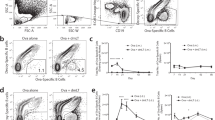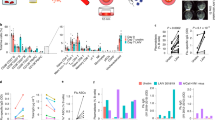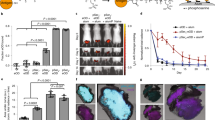Abstract
THE mode of action of immunological adjuvants is of theoretical as well as practical importance. Adjuvants can not only increase immune responses; they can also bring about change from one type of immune response to another. For example, doses of bovine serum albumin (BSA) that in the absence of adjuvant induce tolerance, in the presence of adjuvants induce antibody formation1,2. To understand how adjuvants switch on antibody formation it may be necessary to determine which of the cells involved in the immune response are affected by adjuvants. Earlier experiments3–5 led to the conclusion that the cells initially involved in the action of adjuvants are macrophages. This interpretation was based on observations that particulate adjuvants (such as bacteria) are ingested by macrophages but not by lymphocytes. Non-particulate or particulate adjuvants taken up by macrophages in culture and injected into syngeneic mice increased the antibody response of the recipients to two proteins (Maia squinada haemocyanin or bovine serum albumin (BSA)); in contrast, adjuvants taken up by lymphoid cells used to reconstitute immune responses in irradiated recipients had no demonstrable effect on antibody formation.
This is a preview of subscription content, access via your institution
Access options
Subscribe to this journal
Receive 51 print issues and online access
$199.00 per year
only $3.90 per issue
Buy this article
- Purchase on Springer Link
- Instant access to full article PDF
Prices may be subject to local taxes which are calculated during checkout
Similar content being viewed by others
References
Mitchison, N. A., Proc. Roy. Soc., B, 161, 275 (1964).
Dresser, D. W., and Mitchison, N. A., Adv. Immunol., 8, 129 (1968).
Unanue, E. R., Askonas, B. A., and Allison, A. C., J. Immunol., 103, 71 (1969).
Spitznagel, J. K., and Allison, A. C., J. Immunol., 104, 119 (1970).
Spitznagel, J. K., and Allison, A. C., J. Immunol., 104, 128 (1970).
Roitt, I. M., Greaves, M. F., Rorrigiani, G., Brostoff, J., and Playfair, J. H. L., Lancet, ii, 367 (1969).
Mitchell, G. F., and Miller, J. F. A. P., J. Exp. Med., 128, 821 (1968).
Mitchison, N. A., in Sixth Intern. Immunopathol. Symp. (edit. by Miescher, P.) (Schwabe, Basel, 1970).
Davies, A. J. S., Leuchars, E., Wallis, V., and Koller, P. C., Transplantation, 4, 438 (1966).
Leuchars, E., Cross, A. M., and Dukor, P., Transplantation, 3, 28 (1965).
Taylor, R. B., Transplant. Rev., 1, 114 (1969).
Taub, R. N., Krantz, A. R., and Dresser, D. W., Immunology, 18, 171 (1970).
Benacerraf, B., in Sixth Intern. Immunopathol. Symp. (edit. by Miescher, P.) (Schwabe, Basel, 1970).
Author information
Authors and Affiliations
Rights and permissions
About this article
Cite this article
ALLISON, A., DAVIES, A. Requirement of Thymus-dependent Lymphocytes for Potentiation by Adjuvants of Antibody Formation. Nature 233, 330–332 (1971). https://doi.org/10.1038/233330a0
Received:
Issue Date:
DOI: https://doi.org/10.1038/233330a0
This article is cited by
-
Effects of the potential lithium-mimetic, ebselen, on brain neurochemistry: a magnetic resonance spectroscopy study at 7 tesla
Psychopharmacology (2016)
-
Lithium-induced decrease of brain inositol and increase of brain inositol-1-phosphate is transient
Neurochemical Research (1991)
Comments
By submitting a comment you agree to abide by our Terms and Community Guidelines. If you find something abusive or that does not comply with our terms or guidelines please flag it as inappropriate.



